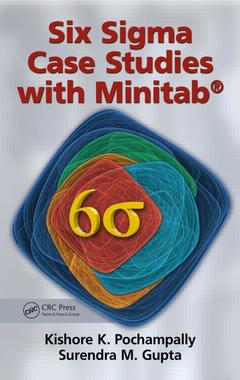Description
Six Sigma Case Studies with Minitab
Authors: Pochampally Kishore K., Gupta Surendra M.
Language: English
Subjects for Six Sigma Case Studies with Minitab:
Keywords
Pe Rc; Define Phase; define; Main Effects Plot; phase; Seq SS Adj SS Adj; measure; DF Seq SS Adj SS; pareto; Binary Logistic Regression; chart; SS Adj SS Adj MS; main; Source DF Seq SS Adj; effects; ANOVA Output; plot; SS Adj; chi; Process Capability Ratios; square; Pearson Chi Square; Interactions Plot; Pareto Chart; Taguchi Design; Probability Distribution Plot; Source DF SS MS; Voc Data; Normality Test Result; Waiting Time; Process Capability Analysis; LSL; USL; Average Waiting Time; DMAIC Approach
135.96 €
In Print (Delivery period: 15 days).
Add to cart302 p. · 15.6x23.4 cm · Hardback
Description
/li>Contents
/li>Biography
/li>
What happens when one of the most widely used quality improvement methodologies meets the world?s leading statistical software for quality improvement? Packed with case studies in a variety of sectors, including health care, manufacturing, airlines, and fast food restaurants, Six Sigma Case Studies with Minitab® shows you how to maximize the quality analysis and improvement tools available in Minitab® for your Six Sigma projects.
Highly illustrated, the book includes detailed steps and more than 380 screenshots that explain how to use:
- Confidence Interval Estimation
- Hypothesis Testing
- Chi-Square Analysis
- Process Capability Analysis
- Binary Logistic Regression
- Item Analysis
- Cluster Analysis
- Mixture Design and Analysis of Experiments
- Multivariate Analysis
- Pareto Charts
- Cause-and-Effect Diagram
- Gage Repeatability and Reproducibility Analysis
- Taguchi Design and Analysis of Experiments
- Factorial Design and Analysis of Experiments
- Statistical Control Charts
The case studies demonstrate the wide range of sectors and uses for Six Sigma and Minitab®. The screenshots provide exceptional detail and the book includes explanations for many Six Sigma terms and an appendix with the contents of the Minitab® worksheets that are referred to in most of the chapters. These features and more give you the tools to meet the challenges of continuous improvement expected in today?s marketplace.
Introduction to Six Sigma Quality. Quality Analysis and Improvement Tools/Techniques. Six Sigma Case Studies. Confidence Intervals to Assess Variation in Fat Content at a Fast-Food Restaurant. Hypothesis Testing for Quality Control at a Manufacturing Company. Chi-Square Analysis to Verify Quality of Candy Packets. Process Capability Analysis at a Manufacturing Company. Binary Logistic Regression to Predict Customer Satisfaction at a Restaurant. Item Analysis and Cluster Analysis to Gather "Voice of the Customer" (VOC) Data from Employees at a Service Firm. Mixture Designs to Optimize Pollution Level and Temperature of Fuels. Multivariate Analysis to Reduce Patient Waiting Time at a Medical Center. Pareto Chart and Fishbone Diagram to Minimize Recyclable Waste Disposal in a Town. Measurement System Analysis at a Medical Equipment Manufacturer. Taguchi Design to Improve Customer Satisfaction of an Airline Company. Factorial Design of Experiments to Optimize a Chemical Process. Chi-Square Test to Verify Source Association with Parts Purchased and Products Produced.
Kishore K. Pochampally, PhD, is an associate professor of quantitative studies, operations and project management at Southern New Hampshire University (SNHU) in Manchester (NH). His prior academic experience is as a post-doctoral fellow at Massachusetts Institute of Technology (MIT) in Cambridge (MA). He earned a PhD in industrial engineering from Northeastern University in Boston. He teaches Six Sigma courses at SNHU and conducts Lean Six Sigma training at service organizations. He is a Six Sigma Black Belt (American Society for Quality) and a Project Management Professional (PMP®).
Surendra M. Gupta, PhD, PE, is a professor of mechanical and industrial engineering and the director of the Laboratory for Responsible Manufacturing, Northeastern University. He earned his BE in electronics engineering from Birla Institute of Technology and Science, his MBA from Bryant University, and his MSIE and PhD in industrial engineering from Purdue University. He is a registered professional engineer in the state of Massachusetts. Dr. Gupta’s research interests are in the areas of production/ manufacturing systems and operations research. He is mostly interested in environmentally conscious manufacturing, reverse and closed-loop supply chains, disassembly modeling, and remanufacturing. He has authored or coauthored more than 450 technical papers published in books, journals, and international conference proceedings. His publications have been cited by thousands of researchers all over the world in journals, proceedings, books, and dissertations. He has traveled to all seven continents—Africa, Antarctica, Asia, Australia, Europe, North America, and South America—and presented his work at international conferences on six continents. Dr. Gupta has taught more than 100 courses in such areas as operations research, inventory theory, queueing theory, engineering economy, supply chain management, and production planning and control. He has received many re
These books may interest you

The Six Sigma Handbook A Complete Guide for Green Belts, Black Belts, and Managers at all Levels 103.28 €

Quality by Experimental Design 56.31 €


